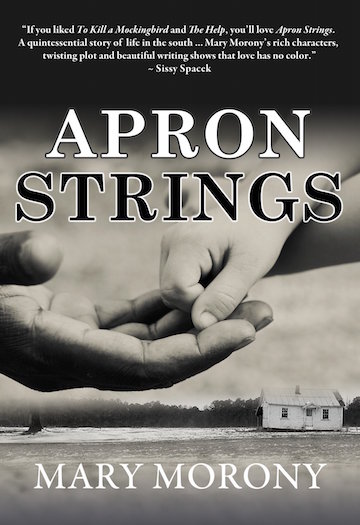[Disclosure: This self-published novel was sent to me by New Shelves Distribution for review.]

Where we would be without the dysfunctional families in Southern lit? We’d miss out on the protagonists in “The Great Santini,” “Bastard Out of Carolina,” and the stories of William Faulkner and Tennessee Williams to name just a few. Mary Morony’s debut “Apron Strings” is another in that grand tradition of Southern families run amok. As Kirkus Reviews writes “Apron Strings” is about “a white Virginia family in the late 1950s that struggles to stay together while enduring a failing marriage and racist neighbors.” The parents employ a black maid, Ethel, who cares for the four Mackey children, ages 14, 9, 7, and 4 as the book begins. It’s the third child, Sallee, 7, who narrates most of the book, chronicling two years of a home life that’s not exactly 1950s Happy Days.
The problem is the mother is harsh and often neglectful, and the father is mostly away at work. The kids, especially Sallee, must rely on Ethel for everything — meals, dressing, supervision, love — you name it. Ever-curious Sallee pesters Ethel with questions about her mother’s life and her life when they first met years ago. Ethel though has her own problems and secrets, which become more clear in the intermingled chapters that she narrates. You get her much-sought perspective though her dialect isn’t always easy to understand.
It’s a 1950s household that is stifling and toxic — amid a town where schools, restaurants, and theaters are racially segregated, and overt racism and violence exist. Author Mary Morony vividly permeates the story with the atmosphere of the times, pinpointing everything from the culture and uptight manners to the pervasive cigarette smoking and the endless high ball drinks and alcoholism. Apparently Morony’s story comes from her own childhood in which she was born and raised in Charlottesville, Va., by her family’s black maid, who she says: “taught me love and acceptance with warm, loving humor and unending patience.”
I found “Apron Strings” an easy book to fall into. The young Sallee is an endearing narrator and the dialogue sounds just right. Sallee’s often trying to keep up with her brother Gordy and learns the hard way after a couple incidents to stay clear of the neighbors house. (I couldn’t help but be a bit reminded of Scout and Jem and Boo Radley’s dilapidated place in “To Kill a Mockingbird.”) But I eagerly followed along to find out what would happen to the Mackey family — if they would split apart and disintegrate or how it would conclude. Divorce back then was a terrible taboo, and what the kids go through pulls them in various directions. It’s not an action-packed book so to speak, the kids often sit around the house on pins and needles, with a mother that’s unavailable or cannot be disturbed and a black maid that’s busy working. At times the ebbs and pulls are more psychological and heart-tugging in nature — as most good dysfunctional family stories are.
For readers looking for a big story arc and climax with tied-up resolutions at the end, “Apron Strings” might be a bit disappointing, just judging by some of the comments on Goodreads. The novel reads at times like it’s chronicling a slice of the kids’ lives when times were very tough during their childhood. By the end, there’s loose ends that remain a bit loose and not all is resolved — there’s not a showdown between the mother and kids, or between the past and present, or any justice against the racist neighbors. It’s a subtle ending, and one that harkens back to the maid’s presence in their lives to pull them through. For me, the vivid atmosphere and Sallee’s narration resound powerfully at times, making it a moving novel through harsh times in the South of the late 1950s. I liked the book and the childhood journey it takes through its minefield of familial and societal mores.
How about you — have you read or heard of this novel, or what is your favorite book about a dysfunctional family?

This sounds interesting and like something I’d definitely enjoy, adding to my wishlist, thanks.
I never thought about ‘southern literature’ much before reading some of Pat Conroy last year where he makes it sound like a genre in itself. It kind of is, no matter what it crosses into, mysteries, dramas, chic-lit, doesn’t matter.
Yeah Southern Lit is a while genre onto itself. Pat Conroy is a master of it too! Thanks Erin.